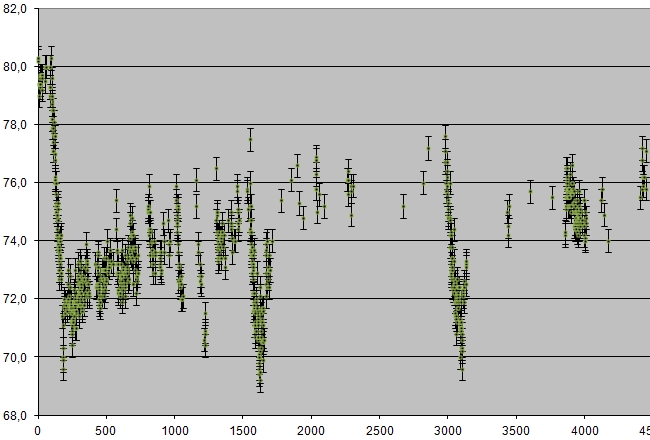Yet we eat, and drink, and eat. We look like self-pleasing monkeys trained to press a button to self-administer a drug. To make matters worse, many of the foods and drinks we consume contain substances purposely added to increase our addiction. So it takes a strong will to control our body weight.
Diets of all kinds exist, but in the end if one wants to lose weight there is only one safe cure: assuming fewer calories. Eating and drinking less, that is. In particular, as we grow older, we need fewer and fewer daily calories to function: we become "more efficient" in using our energy supplies. The visible consequence of that gradual change, to which usually does not correspond a change of eating habits, is the growing of a belly as we become more sendentary, i.e. typically after 35 years of age.
Everybody has his or her story of weight gain and loss, and I do not suppose that mine is special in any way - but as this is my blog I thought I'd take the occasion to show you the graph of my body weight in the last 12 years, which shows a rather striking and not totally voluntary periodicity. After being mildly overweight for most of my young and early adult age, at the age of 36 I decided it was time to try and ease the load on my heart and circulatory system. I was just above 80 kg for a height of 1,77 m (or 177 lbs for 5'6"), so I thought I could use a weight loss of 5 or 6 kg.
The way I did it was simple: I ate much less, using a few tricks. Besides "no-no" foods like bread, alcohol and sweets, which I allowed myself in moderate amounts only once per week, I only consumed 250 kcal at breakfast and as many at lunchtime, plus 700 at dinner; I also tried to fit in those 700 dinner calories as much vegetables as possible. An important ingredient in my diet was the taking of my body weight every morning, something which kept giving me a confidence boost once the weight did start to decrease. In less than three months I lost 10 kilograms, and I declared victory.
After that weight loss I tried to accept that from then on I would just eat less and resettle to a 1800 calories diet, but that has been much harder. About four years later I was back to 76 kg or so, and although one might call that a still acceptable BMI (body-mass index) of 24.3, I decided to repeat my diet. It lasted two months and a half, and I was back below 70kg again. The same thing happened a further 4 years later, but it took me four months to go below 70kg that time. The graph below shows very clearly the periodic behaviour of my body weight in the course of the last 12 years.

Now, four years after my last diet, I am back to square one: a summer full of conferences and banquets has brought my weight above 76kg and that is beyond my confort zone. So I decided I need to do it again, and I have started a new diet a week ago. The funny thing is that I did not plan the timing of the three diets that have followed the original one of 12 years ago: yet they "naturally" came at regular intervals. The second diet started 1453 days after the first; the third one 1430 days after the second; and the fourth one has just started 1439 days after the third.
I will post again about my body weight once I reach my goal, which however this time is not 70 kg, but rather a more manageable 72kg. We will see how it goes!



Comments